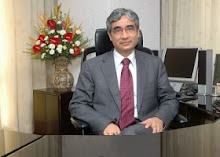In a world defined by our jobs, Anuradha Varma wonders if we stop to ask who we really are?
My name is Shiv Singh. I am 32 and I like to call myself a young philosopher, who otherwise dabbles in a day job.” When Shiv (name changed) took a sabbatical from work for two years, he had people offering him leads, which he politely rebuffed with an “I’m not looking for a job”.
We all come with labels - when we’re younger, it’s as somebody’s son or daughter and later, increasingly, it’s our professions. Work often becomes the identity. But, what are we beyond that? Confesses Nitin Jain, business development director, B. Jain Books, who was ‘born into the job’ or family business, “The next question after your name is, ‘What do you do?’ So people connect you with the job you do. And that is right too as we spend almost 10 hours at the workplace and more thinking about work.”
Seema Hingorrany says her work as a psychotherapist is part of who she is. She accepts, “I don’t think I would be as empathetic, a quality I have imbibed in my professional role.” She adds, however, “I have both men and women coming to me, who do feel lost without their job titles. Work is often a reason to get up in the morning and face the world.”
Life’s preoccupations manage to pin us down so much that we’re often not left alone to be with ourselves even when alone. As Jain confesses, while his ‘alone time’ goes in dreaming of vacations, a lot of it also spent dwelling on achieving targets at work. Work does become part of one’s personality. Says former IPS officer Uday Sahay, who now heads communications for the organising committee of the Commonwealth Games, “I find this job more suited to the person I am. But, I don’t know which is better, as I now talk work even beyond duty hours.” On life as a bureaucrat, he adds, “The mask that we wear at work often becomes the face. And yes, I have seen such people try to ‘organise’ things once back home. It happened to me too. Often, children withdraw as they can’t retaliate, relationships suffer and take time to rebuild.” When he’s alone, he says, he tries to be one with “the rhythm of the universe”.
Interior designer Nandini Boruah Gupta faced an identity crisis when she took a break after having her child. “Once my son grew up slightly, I started to ask myself, ‘What am I doing?’ Housework is thankless. I’m working part-time now and it feels productive.”
For Shilpa Mehra, reality and an identity crisis struck on a trip to Munich. She recalls, “My first job-ghetto shock hit me when I bumped into a Spanish teacher who was a tap dancer, piano player and neo-Nazi artist, depending upon the time of the day and whim! When I told him about my job (as a journalist) he insisted. But what do you do? He added ‘otherwise’ as an apology!” Today, she follows her heart, as a chess player roaming the world playing tournaments and also publishes a chess magazine.
Sometimes, while you may be at ease without a visiting card, others might be keen to slot you. Like with Lord Meghnad Desai, author, politician and academic. People can’t seem to get over his ‘status’. He says, “People often get intimidated by my status or because they think I am status-conscious. I have no problem if they think I am nobody. Having been a teacher, I have talked to students and learned about how to relate to what other people are thinking or worrying about. There are so many things to think about or even sing about, why dwell on anxieties about selfhood?”
In Chetan Bhagat’s book 3 Mistakes of My Life, an Australian coach remarks how in his country, they don’t ask what “one does”, but what game they play. Remarks image consultant Sangeeta S Bahl, “In the UK, people tend to peg you into a slot. But in the US, particularly on the West Coast, people expect you to talk about your hobbies. In New York, work takes over.” She observes, “In India, we function on automated mode. There’s too much competition. Nobody has time to stop and smell the flowers.” No wonder, we often find it easier to have conversations with colleagues, finding more common ground.
So, who are we, really? People who have forgotten to connect on a purely human level, perhaps.
Brahmakumari Shivani tells us how to rekindle our self-awareness, “Sit quietly and become aware of yourself. Just observe. You will notice your self, not as an object but as a being that exists.” As Shiv remarks, “When I started out on my sabbatical, I thought the answers would come, as clearly as they did when I was 15. Who am I, what am I supposed to do be doing? Am I special? Am I going to make it big or am I really just a regular Joe? The only answer I got was that in life there are no answers. In a funny sort of way, that was the answer.”
So, don’t be afraid to push the boundaries, and enjoy the free fall!
Courtesy: TIMES Life, January 24, 2010
Monday, January 25, 2010
Subscribe to:
Post Comments (Atom)





No comments:
Post a Comment